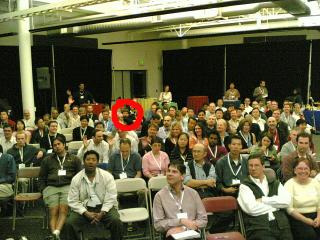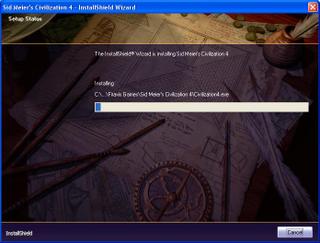I can thank Rajiv, my office-mate, for introducing me to Mobile Mondays. Apparently they started in Finland over a year ago, and since then chapters have sprung up all over. They are informal gatherings of people involved in mobile development, which covers a wide range of companies and positions, and gives people a chance to see what's going on outside their narrow range of interests. Here they are typically held on the first Monday of any given month, although for October it was delayed a week due to a conference conflict.
I really think this is a great idea. It's good for us engineers, because we can indulge in our natural curiosity, cross-pollinate ideas and get inspired for the potential of this technology. It's good for employers, because it's a chance to get access to a bunch of engineers in their field and do some casual networking/recruiting. And it's good for companies because they can show off their stuff and help build interest in their offerings.
Unfortunately, Rajiv was detained on business and unable to make it this time, so I went on my own. I'd been excited ever since the specifics were announced: this month's topic was "Mobile Search," and would be held in unison with the Search SIG. The location was Google's campus; that detail alone would have made me come, I've been entranced for years by stories of Google's unique working environment. The program also sounded solid; several companies would be represented in a panel discussion on the future of mobile search, and several would provide demonstrations as well.
Rajiv had worried earlier about how long it would take to get there. Leaving from work, I'd be driving from the southern tip of Silicon Valley all the way up to Mountain View. Google Maps suggested 20 minutes; I decided to give myself 30, since there was already a buffer of time for registration and food. The drive ended up going very smoothly; despite taking the wrong exit (not my fault, the 85/101 interchange is one of the most baffling and poorly-signed junctions I've seen) I still had time for a scenic tour of the neighborhood before pulling in. Unlike other tech titans who have basically established little fiefdoms, Google's campus feels like it's part of a research park; they share a street with Intuit and some other smaller companies, and while their signs grab your attention their small buildings don't tower like Sun's or Oracle's.
I had my first encounter with Google security pulling into the lot. Throughout the evening the various security guards were extremely friendly, helpful, courteous and visible. He directed me to the appropriate building, which also houses the company cafeteria. I parked a little ways away and enjoyed my walk there.
Google really does let their creativity permeate everything. The lawns were all well landscaped, with shrubbery cut into interesting geometric shapes. Their pedestrian walkways do not go directly from point A to B, but travel in a flattened sine curve. All of the buildings have walls of two-way glass. Each lobby that I passed looked completely different from the others, although each was certainly attractive. One of my favorites had a large plasma monitor hanging from the ceiling that was printing out little line fragments every second, like "inside ukraine" or "dirt bikes." It took me a few seconds to realize that I was probably watching a real-time sampling of actual Google queries.
The Google employees that I met looked friendly and happy. The sun was setting and some were heading home, though many more were visible inside their buildings. There were a TON of bike racks and bicycles around, which didn't surprise me but did please me.
I met up with some other conference guys and together we navigated the way to the cafeteria. Here I picked up my official Google visitor badge and made my way in to the conference room. It was a pretty large setup; they probably had about two hundred chairs set up. People were milling around, chatting, and nibbling on the little wraps Google provided.
I wish I could claim I am a networking genius but I'm really just lucky: that day I happened to be wearing a Wash U t-shirt (under a long-sleeved flannel), and quickly met a fellow alum (B-school, class of '01). We chatted briefly about how we wound up on the west coast and moved on. He's the only alumnus I met that day, but I'll definitely try something similar in the future. That's one of the nice things about the Wash U background, it does stand out here more than, say, Berkeley or Stanford.
Everyone took their seats and we began the panel. It included representatives from Google, Yahoo, two small search startups and Cingular Wireless. There was a designated moderator who kept things flowing smoothly. The general format was that the moderator would pose a question or make a statement, then each person would spend a minute or two giving their company's response. The goal was to share information about what was happening in mobile search and the challenges and opportunities in the future.
Before the panel started in earnest, the moderator gave a brief presentation as a sort of "state of the industry." He showed how the amount of revenue generated by mobile content (ringtones, games, etc., not counting airtime) globally is almost identical to the amount of revenue generated globally by online advertising. He also showed that the market cap of the five biggest leaders in online advertising is several hundred times larger than the market cap of the five leaders in mobile content (Jamdat, etc.). Over all, this implied that there is enormous growth potential in the industry, and that mobile search will prove crucial because search is required for people to find things they want to buy.
Most people reading this aren't as intrigued by the industry as I am so I'll spare you a blow-by-blow summary. The two startups came across as very scrappy and just a little desperate; each one has clawed its way into a niche, or is trying to get into one, and wanted to establish themselves as legitimate. One guy opened his first statement by saying "Wow, being up here between Yahoo and Google [he was actually to the side of them], I feel like a dime between nickels." There was a delay and then a big laugh. From that point on I don't think anybody liked him. He was like a bad but well-coached politician; every single time he talked it was only about how great his company's product was, even if it had nothing to do with the question. Supposedly it "solves the problem" of requiring too many steps for people to find what they're looking for. He would not shut up about it and would not vary his message.
The rest of the guys succeeded in running a good panel. It was very interesting to see the different perspectives people brought to the table. The Yahoo representative was very big on choice, pushing how they wanted to give people as many ways as possible to look for as many kinds of content they'd want to find. The other startup guy took the opposite tack; he said that search was all about limiting choices, about not even showing users things they don't care about and sending them down a narrow path. Google is relatively new to mobile initiatives and is keeping a deliberately open mind, monitoring the desires of consumers and businesses as they work out a strategic vision. And Cingular... the carriers (Cingular, Sprint, Verizon, etc.) are the unquestioned kings of this space, and EVERYONE else is limited by what they decide to permit on their handsets and their networks. Cingular is mindful of the future potential, but is making a great deal of money off the status quo, and wants to continue supporting legacy customers as new services are brought up.
Some interesting facts came out of the panel. Cingular mentioned that, of all its search offerings, the revenue it gets from 411 calls is several orders of magnitude higher than all other search methods combined. The tech companies talked about the various types of mobile search offered and how they are tuned for different platforms: SMS queries (texting a number with a message like "w sf" for "weather in san francisco" and getting back a message with the results), WAP sites (simple web pages designed for mobile devices), and clients (downloadable Java or BREW (yay!) stand-alone applications for search). One example that repeatedly came up is how hard it is for people to find a ringtone on their phone ("Just try to buy a Rolling Stones ringtone. Before you get to the R's you'll have given up or bought something else."); this is an area everyone wants to improve on, simply because it directly impacts how much money people are spending.
It was also a lot of fun to see the individual personalities, other than Mr. Annoying. The other startup guy seemed like a typical post-college startup, a tad slovenly but very passionate about the subject. The Yahoo and Google guys got in occasional humorous snipes at each other without ever mentioning the others' name. They were both engineers who had been coached in PR speak but were still on our side and would wink while giving their boilerplate answers. ("What are Google's plans for making money on online search?" "Google has not yet announced its plans for making money on online search.") The Cingular rep was the only person I saw in the whole room who was wearing a suit, albeit a stylish one, and he was probably the calmest and most open person up there. He was extremely frank about the mistakes carriers had made in the past, like the SMS message limits, and similarly frank about the fact that the carriers still rule the industry.
After the panel, there was a Q&A session. The questions ranged from nakedly hostile ("How can people make money on this when the carriers take up to 50% of the revenues off the top?") to the curious ("How long will it take mobile devices to supplant traditional computers?") to the avarical ("When will we start seeing advertising on mobile phones?") to the nerdy ("What's your backend architecture for load-balancing search queries?"). Each was typically handled by a single panelist. A surprising number of the questioners were foreigners, two were from French firms and another was from Virgin in the UK.
A short break followed, and then came the demos. Yahoo went first, and ran through a variety of their offerings in under five minutes. It all looked very useful and surprisingly responsive.
Google came next. The guy basically said "If you want to see what we're doing, go to mobile.google.com". He then plugged Google Sitemaps, encouraging those who run WAP sites to register with Google so that they get pulled into searches for mobile-specific content. The whole presentation was under a minute and he got even more applause.
The annoying startup guy ran into technical problems (not his fault) and just repeated everything he'd said before about his magical product, AGAIN.
The good startup guy showed off his app, which sadly wasn't as cool as him. It's supposed to basically perform context-sensitive searches, so if you look for, say, a cocktail, it will immediately send you how to make that cocktail, instead of a list of potential results and making you sift through it. It sounds good, but it became obvious that it's very keyword-based and not too intelligent. I wish them well, but they have a ways to go.
Finally, the Cingular guy showed off one of the points he'd made earlier, intended as a reality check for where technology is at today. He brought three people on the platform, gave them three different phones, and told each one that they'd be trying to find the address for a building he would give them. One was to use 411, another would use a WAP browser, and another would use an SMS search. First one to get the answer would win. The building was the Metropolitan Museum of Art in New York City. It took them FOREVER, well over a minute; several people in the audience got it before anyone on the stage. Finally the 411 caller got the answer. The conclusion was simple, "Mobile search has a long ways to go."
They then transitioned to the same ending that every Mobile Monday meeting has, "Open Night Geek." It's a time for people to take 30 seconds to say whatever they want. Quite a few people announced their startups and the positions they were hiring for. Others plugged their services (blogs, etc.) and mentioned their websites. Some gave announcements for other groups that were meeting in the next month.
About halfway through, a guy in a tie (very unusual for this crowd) came up to the mike. He flipped on the projector and set his phone down so everyone could see it. "Hello," he said. "I'm from a little startup called IBM." (Laughter.) "Did you all notice how long it took those people to find out the address of the Met? The Cingular person said it was a big problem to be solved. Well, we at IBM have solved that problem." He entered a program on his phone; I forget the name but the IBM logo was prominent. He picked up the phone and said, "Metropolitan Museum of Art, New York, New York," and set it back down. Within about FIVE SECONDS, it brought back a page of results, and at the very top it displayed the address and phone number of the museum. The ENTIRE ROOM burst into applause. We nerds had finally been impressed.
When the last announcements were done things dispersed pretty quickly. I regretfully took my leave of the campus. I'm not convinced that Google would be the best match for me, but it certainly was a charming place to visit, and I look forward to coming back sometime.
Here's a picture of the panelists, and another one showing yours truly, with my head helpfully circled in red so you can find it.


PS - I totally shouldn't have wasted "You can't always get what you want" on my last post, it would have been the perfect title for this one. Phooey. Also, the
Civilization IV web site is now live! Gather ye rosebuds while you may!









